"Wild Blue Yonder" Dealt With Some Of The Emotional Fallout Of The Flux, So I Want To Rewind A Bit And
"Wild Blue Yonder" dealt with some of the emotional fallout of the Flux, so I want to rewind a bit and look at what that means for the Doctor.
I know that the Timeless Child and the Flux are contentious topics. I'm not here to argue either way. But now those storylines have decisively not been retconned, and with both of these fresh in my memory, I feel the need to offer some context for anyone who may not have seen it, and to recontextualize it for myself and anyone who has.
NotDonna: You don't know where you're from. The Doctor: How do you know that? How does anyone know? How does Donna know?
In "The Timeless Children", we find out that the Doctor was discovered as a child alone under a wormhole, and adopted by a woman named Tecteun. There was an accident where the Doctor fell from a cliff and regenerated, and subsequently Tecteun performed "experiments" on them to try to understand regeneration. The show minces words about this but she killed a child a whole bunch of times is what happened. Her experiments created the Time Lords and allow them to engineer their regeneration properties. The Doctor has no memory of any of this, and only finds out via the Master and information stored in the Time Lord Matrix.
The Doctor, predictably, doesn't tell anyone about this revelation. She makes a speech to the Master about how this makes her more, we get a single shot of her looking a bit tired in the TARDIS, then she immediately gets thrown in prison.
Ultimately, the Doctor doesn't know where they're from or who their parents are. And the very fact that they're not from Gallifrey is information that no one in the universe should have. Everyone who knew is now dead.
NotDonna: I saw it in your head. The Flux. The Doctor: It destroyed half the universe because of me. We stand here now, on the edge of creation, a creation which I devastated, so yes I keep running, of course I do! How am I supposed to look back on that? NotDonna: It wasn't your fault! The Doctor: I know!
A fun fact about the Flux is that the Doctor did not cause it. So why does he blame himself? Because the person who caused the Flux was Tecteun.
The reason why Tecteun wanted to destroy the universe is because the Doctor interfered with things too much. Too much morality. Too inspirational to people. She calls them a virus. So her solution to the problem of the Doctor is to destroy the universe, with the Doctor inside, and take her ship to a different universe to start fresh. She also was the one to steal all the Doctor's memories of previous lives in the first place. She's dismissive and patronizing and clearly does not care about the Doctor on an emotional level at all. Tecteun is a piece of work, and the implications of her actions and how they've shaped the Doctor have the potential to go deep.
Thirteen doesn't get too much of a chance to react to any of this, because there is plot going on. And shortly after they reunite, Tecteun gets killed by a different villain. So there was no emotional closure in the moment, and there's now no possibility for the Doctor to make sense of her actions. The Doctor does not tell any of her friends about any of these events. She keeps promising to tell Yaz but does not.
"Wild Blue Yonder" is the first time we, as the audience, hear the Doctor discuss the Flux. And their perception of events is skewed at best. The Flux wasn't caused because the Doctor made a mistake and a lot of people were killed, which is what you can argue for many other situations. The Flux and the devastation of the universe was caused by their mother, who promptly turned around and told them it was their fault for being such an interfering nuisance. We know that the Doctor is often an unreliable narrator, but this is beyond that. These are the words of an abused child who has internalized the narrative that the abuse was their fault.
So the Doctor being able to talk about this with Donna, who has seen what happened, who knows him, and tells him that it's not his fault — it means so much to him. He wants it to be her so badly. And then NotDonna laughs in his face. You can see the devastation. He thinks for one moment that he can finally talk about this with his best friend, and it's snatched away from him. He gives himself a moment to break down in the corridor, and then you can see the walls rebuilding as he suppresses it all again.
At the very end of the episode, back in the TARDIS, he's trying very very hard to be nonchalant. I'm curious. The NotDonna could remember all these things that happened to me while we were apart. Can you? Just wondering. Things happened, but I'll be fine. In a million years. It's not a joke.
He wants so badly to be able to talk about this. You can see it in all the lines of his body language. He's keeping himself together but is prepared to fall apart in an instant. He doesn't want to actually tell anyone, but if Donna just magically knew already, and could tell him it wasn't his fault — well, that would make the world of difference. But she doesn't know, and he can't bring himself to tell her. And so the cycle continues.
More Posts from Gentildonna and Others

Who else has seen One Specific Episode of Rab C Nesbitt?
You Say Potato, I Say Excellent! Or blocking, accents and legacy of morality tales in ‘The Resurrectionists’ minisode PART II
Alternate title: how Aziraphale’s naivety in this episode was supposed to make you a bit outraged
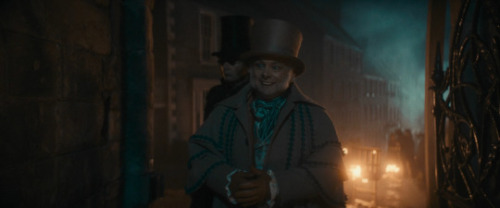
I have to shout out to @bowtiepastabitch for their AMAZING historical analysis of this minisode - it prompted me to finish this long ramble that has been drifting in my notes. Anyway, I have a major obsession with the ways blocking and dialogue interplay in Good Omens - you can check out my analysis of the blocking in the flashbacks in S1. But The Resurrectionists is really something special. This got so long I am splitting it into two parts.
What we see in this minisode is a morality tale - a genre of children’s literature that was extremely popular in the early 1800s where the minisode is taking place. Catch up on the historical background in Part I.
When looking at this minisode, it is really important to look at two complementary narrative tools - Crowley’s accent and the placement of Aziraphale in relation to Crowley. Through the minisode, Crowley switches between his standard English accent and a delightful Scottish accent. But the switching isn’t random!
Scottish lines = character Demon Crowley, who moves the plot of the story along
English lines = Crowley, the moral guide leading Aziraphale
Additionally, the two of them swap sides in their blocking frequently in this episode. Their standard placement is A/R + C/L but the swap to C/R + A/L is almost the norm in this minisode.
Analyzing Blocking and Dialogue
We open in the graveyard, with Aziraphale and Crowley in their standard placement, observing the statue of Gabriel. But then they notice Elspeth, digging up a corpse. When Aziraphale approaches Elspeth to inform her that her actions are Not Good, he actually ends up swapped with Crowley and finds himself on the left because what he is doing - making moral judgments on the actions of Elspeth with no understanding of what led her here - is doing Good, not good.

The next scene finds Crowley helping Elspeth cart the corpse away from the graveyard, while the trio debate all the other ways Elspeth could make money - Aziraphale suggests running a bookshop, farming, weaving, giving the standard Good party line about hard work blah blah blah. Aziraphale remains on the left - after all, those supposed options are completely unrealistic, unobtainable professions for someone in Elspeth's socioeconomic position. They aren't remotely helpful suggestions.
Aziraphale only finds himself back on the right when he and Crowley are introduced to Wee Morag, and have some time to listen and observe the reality of their situation.
Then, off we go to complete our journey to sell the body. Aziraphale and Crowley find themselves having a debate about morality, but Aziraphale is again ON THE LEFT as he waxes poetic about the virtues of poverty - doing Good, not good again. What I loved here was you saw the clear purpose between Crowley’s two accents as he switched mid-line -

Crowley: (SC) Oh, I'm down with wicked! (EN) Anyway, is it wicked? She needed the money.
Upon reaching the lodging of Mr. Dalrymple, FRCSE, Crowley and Aziraphale take their standard places but this scene has one really important moment that I want to highlight. When they open the barrel to find the rotted corpse, the look on Crowley’s face is so telling. He often finds Aziraphale’s machinations amusing even when they are annoying, but here he looks decidedly disappointed. Aziraphale might have done Good by rendering the body unsellable, but what good did it do? The body is still been un-interred. Elspeth has wasted her energy, and has made a terrible first impression of the surgeon whom she needs to pay her for her services. It looks like Crowley wants to say something, but he stops himself and clenches his jaw. The PATIENCE he is showing to Aziraphale - this is a quality that Crowley has in SPADES but we really see him exercise it here.
After the discussion with Mr. Dalrymple, in which Aziraphale realizes the importance of dissections for educating medical students and thus leading to better care for the living, he asks the right question - why should the poor have to risk death to obtain bodies? But he let's himself get sidetracked by a blatant appeal to his emotions...
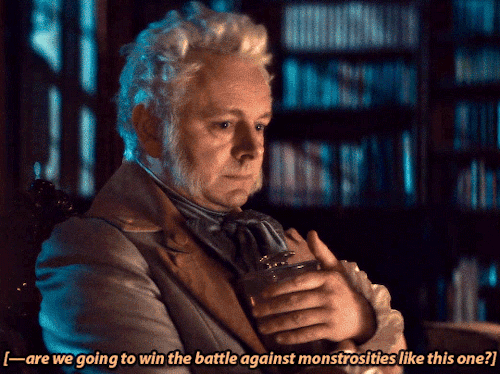
At this point, Aziraphale goes all in on body snatching being Good. Which... it still isn't because it is based on a broken system that disadvantages the poor? FOCUS, angel. He even goes as far as to offer to help Elspeth and Wee Morag in obtaining another corpse but note that again, he is on the LEFT -
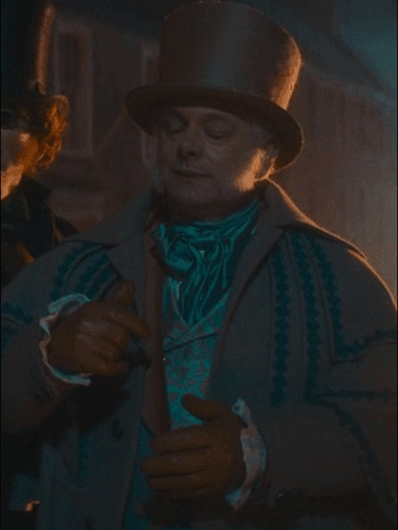
Remember, Wee Morag is deeply conflicted about the morality of body snatching, and instead of explaining anything to her (like, that having your body dissected won't keep you out of heaven would be start) Aziraphale just sort of joins Elspeth in pressuring her to join in - which is pretty awful and coercive, but gee if that isn't just heaven's playbook for doing Good, not good.
So we return to the graveyard, and this is where everything goes sideways. Aziraphale spends basically this entire sequence on the left. First, he notices the ingenuity of the grave guns but fails to acknowledge the travesty of so much energy being spent on protecting wealthy corpses while the poor suffer. Then, the tragedy strikes. After Wee Morag is shot, Aziraphale wastes time justifying saving her, resulting in her dying before he can act. And after all this, after the heart break of seeing her partner die, we see Elspeth come to the logical conclusion. If body snatching is Good, then might as well take Wee Morag off to Mr. Dalrymple, right?
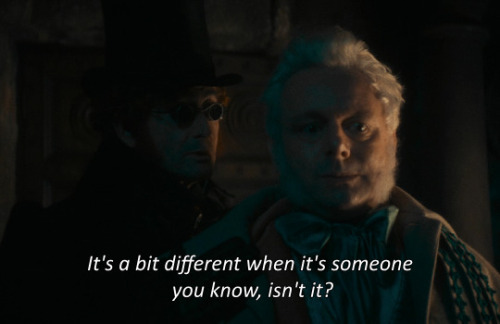
What shouldn't be overlooked is what takes place when Elspeth gets Wee Morag's body to Mr. Dalrymple. Because while Aziraphale is very clearly illustrating the dangers of black and white morality through religion, Dalrymple is showing that black and white morality through science is just as bad. Dalrymple has unshakable belief in the power of science and knowledge to alleviate human suffering and sees his work at Good. He cares about preventing illness, but ignore his role in perpetuating poverty - an unfortunate side effect of rigid belief systems of all shapes and sizes. He is downright cruel to Elspeth.
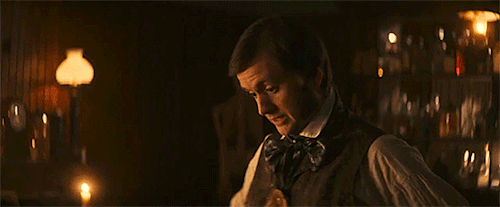
This is already getting real long, so we won't go into the absurdist comedy of the scene in the tomb - suffice to say that the surreal nature of Crowley's bargaining with Elspeth smacks of a fantastic tales of pacts made with the devil. It's delightfully unhinged.
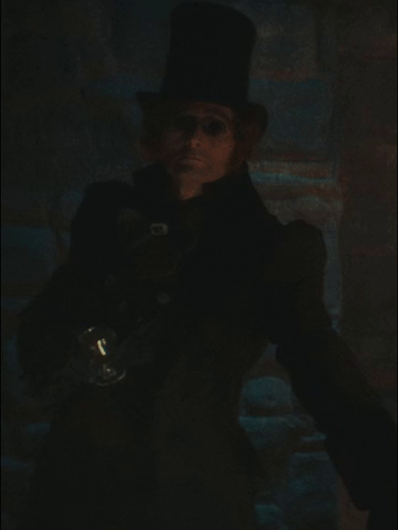
The one line I think worth pointing out?
"Do I sound like a goat?"
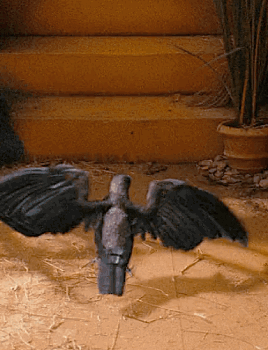
I think this line is key in the narrative connection between the three minisodes in S2. All three flashbacks show Crowley and Aziraphale engaging in acts of deception, but they all have important differences:
In A Companion to Owls, the two work together, and they manage to pull off the trick and evade punishment.
In Nazi Zombies from Hell, Aziraphale comes up with a plan and Crowley goes along with it, and they barely manage to evade punishment.
In The Resurrectionists, Crowley comes up with a plan and Aziraphale goes along with it, and Crowley is sucked down to hell.
I think it's worth noting just how silly Crowley is in the first two minisodes. Bildad and Scottish Crowley are FUN even when dealing real heavy shit. Just a complete joy to watch. And we never see that level of silly from him again. Whatever happened in hell was clearly really bad since the next time we see him in St. James Park he is asking for holy water. He may have moments, but he is never the same.
Questions, comments, additional thoughts? Lay them on me. I'd love to dig into new lines of inquiry on this minisode because I just love it so much <3
Which one exactly? I'd say both, though I definitely get what you mean ...

The Eyebrow…
There are no capital letters capital enough to express how stylistically impeccable that artwork is. WOW is nowhere near enough.

good omens posting !!! (click image for optimal quality)
prints available here
After reading so much angst and real honest-to-goodness psychological drama, I revel in the warm, light and touching stories like these. There's a Russian expression "my kind of plantain/works like a plantain", which means that some fic or headcanon is good for soothing pain and heartache. And this is exactly MY kind of plantain. I love it. Incredibly so.
The most romantic moment that Aziraphale could have imagined, it’s raining and they’re absolutely soaked, but he has his arms around Crowley’s shoulders and he’s kissing him and Crowley is kissing back and oh it’s like straight from a book!
And when they pull away just an inch and Aziraphale has a dreamy look on his face and he notices Crowley’s happy smirk and he sighs.
“Alright you can say it.”
“Vavoom!”
So shapely, innit?

I feel like a Victorian man seeing an ankle…
Favourite ship dynamic: no one truly knows what exactly is going on between the two characters, including the characters themselves. But whatever it is, it's written in the fabric of the universe.
I’ve seen a lot of posts about Az being controlled by the Metatron but I don’t buy it.
I’m fully on board with Aziraphale making stupid decisions for what he believes is the greater good. We’ve had evidence time and again of him wanting to get Crowley back on the side of angels so he’ll be safe. “they’ll destroy you”/“they’ll kill you” was his biggest fear all through S1 and that fear hasn’t gone away, especially now the neutrality protection has gone from the bookshop and Heaven and Hell can both get in.
You’ll notice he said “I don’t want to go back to heaven” until the moment the Metatron tells him that it means he could guarantee Crowley’s sanctuary and safety. And this is not ten minutes after the rest of heaven’s archangels were planning on wiping Aziraphale completely from the book of life and leaving Crowley alone? The Metatron didn’t have to threaten Crowley. The threat has always always been there. Aziraphale didn’t choose death because he’s predictable.
Trouble is that the Metatron knew Crowley wouldn’t want it (he’s always been an independent one, going his own way, asking questions) and is using this as something to drive a wedge between them. Because the Metatron fully admitted that “we’ve kept track of your history” and as Gabe said re. Armageddon “at least we know who’s fault it was” that it stopped.
Together, Crowley and Aziraphale have stymied Heaven more than once. Together, they produced a miracle that exceeded the power of the Supreme Archangel and could raise the dead 25-fold. Together, their interference/cock-ups led to the failure of Armageddon and Heaven doesn’t want to risk that when they’re working up to the big one, The Second Coming.
They know Aziraphale and Crowley together would be a liability. They needed them separated by whatever means and they have it. They knew Aziraphale would want to do good - everyone knows Aziraphale is a good guy. Even Gabriel, when his memory was gone, went straight to Aziraphale because he instinctively knew this is someone who would protect him. And everyone knows that Crowley is the rogue angel. The Metatron clearly knew him and described him as someone “who always wants to go his own way”.
The Metatron played on both their fears. He also played on Aziraphale’s belief that Heaven can still be good: he came in just in time to save him from erasure from the book of life, he implied that he’s much more like Aziraphale by bringing him nice sweet things and encouraging him to imbibe them, he offered safety and protection for Crowley to keep him out of harms way. But simultaneously, he slammed Crowley’s big red horror button at the idea of being under Heaven’s thumb again. He knew exactly what he was doing.
TLDR: Aziraphale did what he always did. He’s a guardian. He’s doing what he feels he needs to in order to keep people safe. And Crowley did what he always did by rejecting Heaven. The Metatron used that and pressed his and Crowley’s buttons to make sure he split up the dream team to make sure the next Armageddon isn’t interrupted by their interference.
When I first watched Good Omens 2 I was surprised by the ending. I had been so focused the romance of the season. The Jane Austen, the witty retorts, the dancing, the secrets glancing. I took the bait and when the ending came I fell hook line and sinker. Much like Crowley I felt I had drove into a pot of boiling sulfur. But then looking back I realized if I had actually been following the story we were being told instead as of getting swept up in the romance, I would have realized it was never going to end happily.
The flashbacks are what really foretell the ending. They aren’t just fun romps through history. They serve a purpose. And the purpose is to set up and elaborate upon how Crowely and Aziraphale see the world and each other, and how they see heaven, hell and earth. And what these flashbacks prove is they have huge gaps between the ways they see the world that need to be bridged. Those gaps could have been crossed ages ago but as the flashbacks show multiple times- Crowley and Aziraphale don’t communicate well and that leads to disaster. It will destroy them if they don’t sort it out- I mean their ability to communicate is so lacking that it literally ends with Crowley pointing a gun in Aziraphale’s face and shooting it. And he gets in this pickle because he loves him! Which is pretty twisted! And if the gun wasn’t dangerous enough their friendship them almost gets revealed to hell by zombies- grossly incompetent zombies at that! If Aziraphale hadn’t managed to pull off that magic trick- which easily could have happened. He’s very bad at magic. Who knows what horrible things would have happened to the both of them.
This miscommunication gap also hurts the people around them. If Crowley had explained the why Elspeth was graverobbing to Aziraphale instead of letting him watch and figure out for himself maybe things wouldn’t have gone so far and Wee Morag wouldn’t have ended up dead. Or at least Aziraphale and Crowley could have found away to help Wee Morag that didn’t involved inspiring displays of well… Scottishness? while being drunk on laudanum that end up with Crowley getting sent to hell and tortured (tortured to the point that some people have pointed out that when Crowley gets he asks for holy water for insurance- which is just plain sad and awful, and leads to even more conflict between Aziraphale and Crowley. Or if Aziraphale hadn’t felt the need to plan an entire ball just to dance with Crowley- cause let’s be honesty that’s really why he did it- maybe all of his guests wouldn’t have ended up in danger.
I remember upon watching the episode with the graveyard and Scottish Crowley- being dismayed with how behind ideologically Aziraphale was compared to Crowley. I knew he would do a huge amount of growing in the two centuries to follow. But part of me had filled in the blanks and assumed he would be farther along in that journey by the 1800s. I remember wondering how he was going to catch up in between then and the present day. When I watched the finale episode I realized he hasn’t caught up. He hasn’t quite made the leap away from heaven. He might think he has and Crowley might even be starting to think that too. He even had us as an audience beginning to think he had let go of that baggage But Aziraphale’s problem is he wants to do good . He wants to save the world and heaven with it. he can’t quite give up the ghost- he is too self sacrificial. He’s going to need to learn that he, like many kids of abusive parents- can’t fix the situation he came from. Not without sacrificing himself. He’s going to have to stop running and confront his baggage to truly be free of it. And Crowley on the other hand needs to realize he can’t just run from his past. He needs to reckon with his time as both angel and demon. He needs to grieve what was taken from him instead of just living in opposition to it. Because Crowley’s problem is he too wants to save the world. He just wants to do it in his own (and maybe with Aziraphale, but mostly on his own). He too is way too self sacrificial to the point that he sacrifices himself and his sense of self time and time again all in the name of his own side. His side may be the only truly good one between heaven and hell. But he is only one entity. He has to learn to open up again. To truly open up. Which is why it’s so frustrating that when he finally opens up to Aziraphale in episode 6, things go wrong! But as frustrating as it is, it sets an amazing stage. It gives Aziraphale the chance to build up Crowley’s trust. To build up Crowley’s faith in them as team. So that when Crowley opens his heart again it’s done on his own terms and in a way that is healing. Poor Crowley has been though so much, and he has been through so much of it alone. People can affirm themselves and their path’s in life only so much with out needing some support from others. Notice how Crowley is still living in his car. He never asked if he could move into Aziraphale’s bookshop. He sees himself as a burden, as not good enough for the angelic Aziraphale that he so admires. He probably thinks he would weigh him down. Crowley needs affirmation to heal. He needs to be loved and not loved in a way that’s cloaked with shame, but loved in a way that is able to sit with self comfortable. But Aziraphale is not at the point where he can give that love yet. When that happens he can help Crowley heal from his abandonment by heaven. He’s been picking up after heaven’s mistakes since before his fall. It’s time for someone to take care of him in return. Because as much as Crowley says his actions have nothing to do with heaven or hell, he does still feel burdened by their weight. Now he can’t do this journey just with Aziraphale. He needs to do some of it on his own. Bu he needs love to heal- we all do. So does Aziraphale. They can give each other that. But they have to be ready to. They have to do the work they need to do on themselves to get to that point.
I think I have a potentially controversial opinion on Aziraphale and the ending.
So one of the things that made me smile so, SO much, was THIS:


That PURE ABSOLUTE UTTER JOY.
We have not seen ANYTHING like that from demon Crowley. We've seen him be drunk and silly, we've seen him be amused, but we've not seen this.
Now, let's consider what we know about Heaven:
It's never fully populated. ALL of the shots are completely devoid of angels, except for a few, who are almost always just getting somewhere and never really talking to each other.
Where I thought the archangels were a tight clan, it really looks like they're super catty and prone to jealousy. No doubt they would stab each other in the back happily if it came down to it. How much of Heaven is like that, if even the archangels all hate each other?
Aziraphale already has a nervous disposition when he meets Crowley. Is he perhaps an angel that NEVER fit in? Is he familiar with being ostracized by his peers? Just how lonely IS Heaven? Crowley seems to be a pretty powerful angel, and HE doesn't even know that it's all getting shut down in 6000 years -- it's like no one talks to anyone.
Aziraphale, during their whole meeting, looks absolutely smitten. At one point, Crowley goes, "Look at you! You're gorgeous!" and Aziraphale looks over with happy surprise, just before realizing he's not looking at him but rather at what he's created. And then, when Crowley starts going on about making suggestions and asking questions, Aziraphale is IMMEDIATELY concerned and doesn't want him to get into trouble.
Aziraphale is hooked on this angel, and I cannot help but think that this is perhaps the first angel who has ever WELCOMED Aziraphale into his company.
He is hooked on this angel, and the way Crowley smiles is with the light of all the stars he's just created, and it's infectious and it brings a smile to Aziraphale's face as well. And then this angel shields him from the oncoming falling stars.
He is hooked on this angel, and then this angel goes and joins the Great Rebellion, and becomes fallen himself.
"You were an angel once," Aziraphale said, softly, at the bandstand. He remembers.
I think it's reasonable to guess that Heaven has never felt so warm as it did in the presence of millions of exploding stars, next to the (arch?)angel that may perhaps be one of the few (only?) to pay him any positive attention.
I think it's reasonable to assume that Heaven was not the same after Crowley fell. I wouldn't be surprised to find out Aziraphale had wondered about the angel, wondered if he was okay. I would imagine that Aziraphale keeps that picture of pure, angelic, unbridled joy somewhere inside of him.
So, really, is it any surprise that threaded throughout EVERY interaction, Aziraphale has this deep-down feeling that Crowley is good? Would it be any surprise that Aziraphale, an angel who goes along with Heaven as far as he can (which isn't always), feels that if HE is still an angel, then what was done to Crowley was a great injustice?
I think it would make sense that we are shown "before the beginning" not just because it is fun, but because THIS is the foundational context for everything Aziraphale thinks Crowley is, everything Crowley enjoys. I think he remembers this moment and wishes he could live there forever. With Crowley. The two of them with this happiness, forever.
But nothing lasts forever, as much as he wishes it did.
I'm not saying Aziraphale was right with what he did to Crowley at the end of s2. There is a lot I think he did wrong. I think he held onto this picture so tightly, he didn't realize that Crowley had long since let it go, and painted a new one with Aziraphale with all the shades of grey he picked up as he sauntered (or plummeted) vaguely downward (into a pool of boiling sulfur).
I don't think he was right, but I do think he is understandable. I think there was a lot of selfishness, but also some misguided selflessness too. I watched that first scene with angelic Crowley and my heart actually broke a little, because I thought, "What a shame this joy was taken away from him."
I think Aziraphale is trying to right the injustice he feels has been done. But I also think Aziraphale doesn't realize that Crowley can never go back. The concept of falling never crossed Crowley's mind when he suggested that he ask a few questions, and he will NEVER get that kind of innocence back. And Aziraphale doesn't understand, because Heaven has clearly always just been that way for him (he is already aware of the danger of asking questions).
Crowley does not want to go back because he can never go back. He can never be the same angel he was when he thought he could build a universal machine that would crank out stars for eons and eons. He can never be the same angel he was when he thought he could make some suggestions and ask some questions and co-create with THE Creator.
Crowley understands that, and Aziraphale doesn't. But I can understand why Aziraphale would want to try. And I think it's all because of this:

-
 infinitygm451 liked this · 2 months ago
infinitygm451 liked this · 2 months ago -
 spaceagesparkledust liked this · 6 months ago
spaceagesparkledust liked this · 6 months ago -
 thewanderingplanets liked this · 8 months ago
thewanderingplanets liked this · 8 months ago -
 luz-noceda-for-realsies liked this · 9 months ago
luz-noceda-for-realsies liked this · 9 months ago -
 jemmathescientist liked this · 11 months ago
jemmathescientist liked this · 11 months ago -
 halfbloodliz liked this · 1 year ago
halfbloodliz liked this · 1 year ago -
 thirteenhoursago liked this · 1 year ago
thirteenhoursago liked this · 1 year ago -
 luvtm liked this · 1 year ago
luvtm liked this · 1 year ago -
 kationella liked this · 1 year ago
kationella liked this · 1 year ago -
 ktvexi liked this · 1 year ago
ktvexi liked this · 1 year ago -
 guenifhar liked this · 1 year ago
guenifhar liked this · 1 year ago -
 cythereafemme liked this · 1 year ago
cythereafemme liked this · 1 year ago -
 landscaping-your-mind liked this · 1 year ago
landscaping-your-mind liked this · 1 year ago -
 eternal-faith1 reblogged this · 1 year ago
eternal-faith1 reblogged this · 1 year ago -
 eternal-faith1 liked this · 1 year ago
eternal-faith1 liked this · 1 year ago -
 clairedelune-13 reblogged this · 1 year ago
clairedelune-13 reblogged this · 1 year ago -
 morganas-pendragons liked this · 1 year ago
morganas-pendragons liked this · 1 year ago -
 teloles-and-friends reblogged this · 1 year ago
teloles-and-friends reblogged this · 1 year ago -
 reloha liked this · 1 year ago
reloha liked this · 1 year ago -
 saltywhovian liked this · 1 year ago
saltywhovian liked this · 1 year ago -
 martianbugsbunny liked this · 1 year ago
martianbugsbunny liked this · 1 year ago -
 agentark liked this · 1 year ago
agentark liked this · 1 year ago -
 theboysbefore reblogged this · 1 year ago
theboysbefore reblogged this · 1 year ago -
 mrsquiggle-themanfromthemoon liked this · 1 year ago
mrsquiggle-themanfromthemoon liked this · 1 year ago -
 picnokinesis liked this · 1 year ago
picnokinesis liked this · 1 year ago -
 la-verite-doree liked this · 1 year ago
la-verite-doree liked this · 1 year ago -
 queenofquestions liked this · 1 year ago
queenofquestions liked this · 1 year ago -
 lesbxdyke reblogged this · 1 year ago
lesbxdyke reblogged this · 1 year ago -
 simplyljh liked this · 1 year ago
simplyljh liked this · 1 year ago -
 thecrystal-cave liked this · 1 year ago
thecrystal-cave liked this · 1 year ago -
 thatbackuplesbian reblogged this · 1 year ago
thatbackuplesbian reblogged this · 1 year ago -
 thatbackuplesbian liked this · 1 year ago
thatbackuplesbian liked this · 1 year ago -
 handsoffmyminnie reblogged this · 1 year ago
handsoffmyminnie reblogged this · 1 year ago -
 dymphna133 liked this · 1 year ago
dymphna133 liked this · 1 year ago -
 zebrabaker liked this · 1 year ago
zebrabaker liked this · 1 year ago -
 ellanarose reblogged this · 1 year ago
ellanarose reblogged this · 1 year ago -
 sparrowsabre7 reblogged this · 1 year ago
sparrowsabre7 reblogged this · 1 year ago -
 drwatsonsong13 reblogged this · 1 year ago
drwatsonsong13 reblogged this · 1 year ago -
 drwatsonsong13 liked this · 1 year ago
drwatsonsong13 liked this · 1 year ago -
 handsoffmyminnie liked this · 1 year ago
handsoffmyminnie liked this · 1 year ago -
 interestingturnofthetables liked this · 1 year ago
interestingturnofthetables liked this · 1 year ago -
 mysticalenthusiastvoid reblogged this · 1 year ago
mysticalenthusiastvoid reblogged this · 1 year ago -
 worldwearyblonde liked this · 1 year ago
worldwearyblonde liked this · 1 year ago -
 dirtyscholar reblogged this · 1 year ago
dirtyscholar reblogged this · 1 year ago -
 dirtyscholar liked this · 1 year ago
dirtyscholar liked this · 1 year ago -
 chocolatepot liked this · 1 year ago
chocolatepot liked this · 1 year ago

Doctor Who, Good Omens and basically everything DT is in | Not a shipper per se, but feel rather partial to tensimm f***ed-up dynamics. Some other stuff as well - Classic Rock (mostly British), Art Deco, etc
228 posts